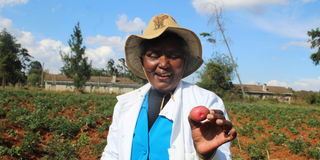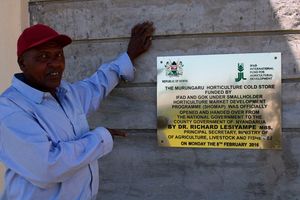New potato varieties with high yields

Prof Miriam Kinyua, a plant breeding and biotechnology expert, displays the new potato varieties at the University of Eldoret farm.
What you need to know:
- The three varieties — Eldo Amani, Eldo Bidii and Eldo Fanaka — were developed recently by a team of scientists at University of Eldoret.
- The varieties are able to withstand pests, diseases and erratic weather conditions.
Part of the expansive University of Eldoret farm is teeming with potatoes. The crops were planted last November, and despite the region experiencing low rainfall for the past two months, they are flourishing.
The potatoes are neatly lined up on a 10-acre parcel of land and it is hard to tell whether they are different varieties.
“The rains have not been consistent and we don’t irrigate the potatoes. They were planted in late October and so far they are performing well. They have not been attacked by blight or bacterial wilt,” says Prof Miriam Kinyua, the project lead and a professor of Plant Breeding And Biotechnology in the School of Agriculture, University of Eldoret.
The three varieties — Eldo Amani, Eldo Bidii and Eldo Fanaka — were developed recently by a team of scientists at the university. The varieties are able to withstand pests, diseases and erratic weather conditions.
“They generate up to 50 per cent more yields and are tolerant to pests and diseases and thus farmers spray less. This means reduced cost of production and no exposure to agro-chemicals that comes with health risks. However, the plants are heavy feeders since one has to use more fertilisers and ensure the field is weed-free. I can guarantee you that one can harvest up to 200 bags from an acre,” explains Prof Kinyua.
The researchers used a mutation technique where gamma rays were used to alter the character of the potatoes so they can tolerate adverse weather conditions, pests and diseases such as blight.
Prof Kinyua explains that Amani is a high-yielding variety that produces 57,000kg per acre. It has white skin and is preferred for making French fries. It takes between three and three and a half months to grow to maturity.
“The Eldo Bidii is good for table use and is resistant to diseases; majorly bacterial wilt and late blight. It matures after four months. The variety is also a high yield at 59,000kg per acre,” states Prof Kinyua.
Eldo Fanaka variety is suitable for table use and is resistant to diseases. It matures between 3.5 and four months and yields 55,000kg per acre.
“We did an organoleptic test and found out that Fanaka is tasty, cooks well and can be used for stews, mukimo, roast potatoes and other delicacies. For Amani, it is good for cooking French fries because it has a high dry matter of about 22 per cent and doesn’t take in too much oil,” Prof Kinyua tells Healthy Nation.
In 2021, the varieties successfully underwent National Performance trials through the Kenya Climate Smart Agriculture project to assess whether they were high yielding and possessed a unique character compared to those in the market.
“The new varieties planted in different agro-ecological zones such as upper Nakuru, Uasin Gishu, Nyandarua, Nandi and Elgeyo Marakwet competed well with existing varieties. For instance, in the Burnt Forest area that reports many cases of serious late blight, the new varieties survived well,” she says.
In Kenya, potato is the second most important staple food after maize. However, the yield levels are low and stand at nine tonnes per hectare compared to a potential yield of between 20 and 40 tonnes per hectare.
In 2014, the country witnessed the worst outbreak of late blight in various potato growing zones and since then, farmers have been grappling with the disease.
“The low yields are attributed to biotic and abiotic stresses, which include lack of quality seeds and planting materials, low soil fertility, low-yielding varieties, diseases and pests and poor response to different environments and climatic changes; among others,” notes the researcher.
So how safe are these varieties?
The expert assures that the varieties are fit for human consumption, saying they were subjected to proper testing before their release to the market.
“When people think about mutation techniques, they think potatoes are radioactive. Look, I can even hold them in my hands; they are not radio active. The radioactivity doesn’t stay within the plants.
“The varieties are safe for cultivation and consumption. I remember the nuclear regulatory agency made us put on sensors for a whole year to establish whether there was a danger of nuclear energy going through bodies and it was proved that it is even safer than some environments where there are high radiation levels,” states the expert.
The researcher further observes that unlike Genetically Modified (GM) varieties where a foreign gene is introduced, no new foreign genes were introduced into the mutated varieties.
“These are not GM varieties because we did not introduce new foreign genes. It is still the same potato; Amani came from Asante while Bidii and Fanaka came from the Sherekea varieties,” says the expert.
Prof Kinyua explains that University of Eldoret is working to provide adequate potato seeds to farmers by the end of the year. “The germination rate of these varieties is over 99 per cent. Most farmers are looking for the seeds and we are ready to distribute them for cultivation,” she states.
Last year in April, the Ministry of Agriculture gazetted the three varieties for release and commercialisation in the market.
According to Prof Thomas Cheruiyot, the university’s vice-chancellor, the institution is repositioning itself to serve as a seed multiplication centre for both crops and livestock to boost farmers’ yields.
“We are seeking partnerships with counties to enable them to provide quality and certified seeds for local farmers in order to ensure higher productivity and food security. For instance, we are working to ensure provision of embryo transfer technology to farmers for livestock breeds such as dairy goats, dairy cows and those for beef,” states Prof Cheruiyot.





